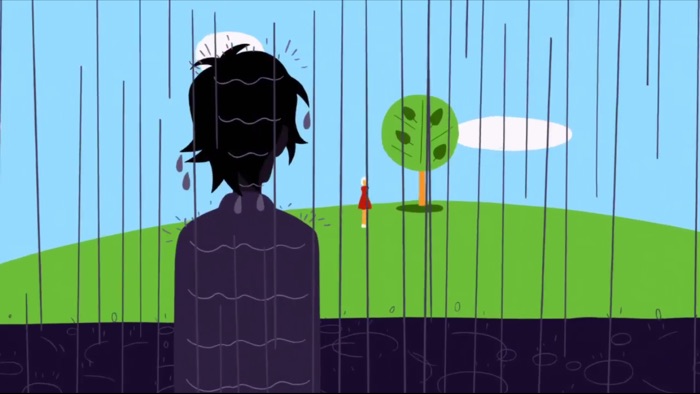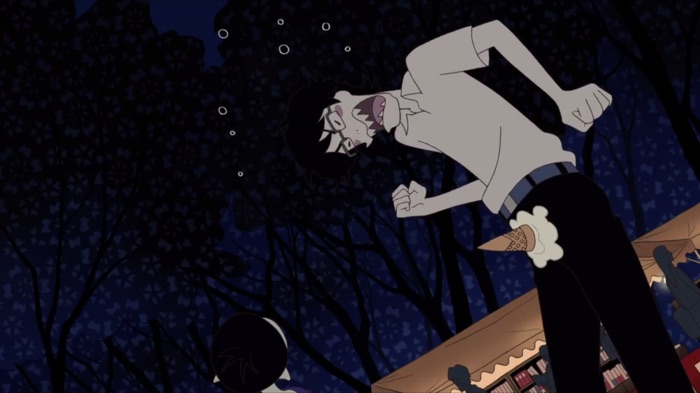The Night is Short, Walk on Girl

I went to the UK premiere of Maasaki Yuasa’s most recent movie, The Night is Short, Walk on Girl in Glasgow this evening. It’s on general release here in the UK on the 4th of October, but the man himself was actually at this screening (along with, it turned out, producer Eunyoung Choi), so it seemed like it’d be worth the trip to see it early.
The turnout was a little disappointing, honestly. I mean, I was sat near the front, so I didn’t especially have the best view of the full auditorium, but it was looking to only really be around 1/3rd full. I gather the London screening on Monday is faring somewhat better (they sold out and upgraded the screening to a larger screen). I guess a movie by a director as idiosyncratic as Yuasa, particularly where his works haven’t always necessarily been widely available in the UK, shown in isolation, isn’t exactly a recipe for a huge audience. The positive from this, at least, is that the audience at least seemed to know their stuff, and the audience QA questions were actually pretty good (unfortunately, my notes from the event aren’t!).
Preamble aside, there’s a couple of maybe questionable things about it, but I enjoyed the movie a great deal – a lot happens in it, and it moves along at a fair old clip. That being said, it’s rather hard for me to say anything particularly cognizant about it – it’s an awful lot to take in from just a single screening of it, and I don’t particularly want to spoilt some of the things that are easy to talk about before more people have the chance to see it.
The base narrative is pretty deceptively simple. There’s a nice, happy girl (only really referred to as The Girl With Black Hair) who likes drinking and is out on an evening seeking alcohol. There’s a guy (only really referred to as Senpai) who is attempting to romance her in the most roundabout fashion possible (he deliberately keeps running into her under the pretext of it being a coincidence in the hope that she thinks they’re fated to be together). Over the course of a single, rather epic, night, they go through equally insane, surreal stories, encountering some eccentric characters, that run on an occasionally intersecting course that feels like it’s inevitably going to properly collide. Also some stuff about the perception of the passage of time.
If you’ve seen The Tatami Galaxy, well, you are probably on good footing for Night is Short, though. I don’t think knowledge of The Tatami Galaxy is particularly essential in any fashion to enjoy the movie, but whilst the larger commonalities are in a context that works without knowing how they played in Tatami, there are a lot of rather more low-key and off-hand jokes and references you’ll not pick-up unless you are familiar with it (there was a reoccurrence of a certain climbing wall which I’m not entirely sure much of the audience picked up on given the relative lack of reaction). I’d say it’s a richer experience for knowing it.
It will set you in the right direction for the tone of the piece, regardless – Night is Short is still something that pounds the audience with rapid-fire dialogue. That said, it’s a little less brutal in that respect than Tatami – by Yuasa’s own admission, part of the appeal of adapting Night is Short as a movie is that theatrical animation allows a much more event ratio in terms of splitting the heavy lifting between dialogue and animation (that is, movie production is a lot more generous when it comes to the number of drawings and cuts they can use in the same amount of time versus a TV production). Much of the rebalancing here comes from stepping up the animation side of things, rather than stepping down the dialogue, though, so whilst it’s certainly a little easier to keep up with, it’s not by much.
As is common with Yuasa, the animation is rather more eccentric than what most of the anime industry produces. The movie starts you off on the right foot for expecting something cartoony as it is – there’s some slightly weird posturing and abuse of perspective from the very start, and characters bulge and contract as they down alcoholic beverages. As the epic bender that comprises the movies opening act continues, the characters motion does often break into dance that makes the characters perform motions that would look more at home in an old Fleischer or Disney short than in anime.
As the movie progresses, whilst it might not get quite as narratively out-there as The Tatami Galaxy did, things do get more and more visually insane – Yuasa is a fan of Flash, partly because of the clarity of image it results in, but the unusually aggressively digital pipeline in use at Science Saru does result in a certain level of dynamism that, whilst certainly not entirely unique, is certainly uncommon. The Night is Short is never not-interesting to look at, and, honestly, this is the first anime film in a while where I’ve managed to completely lose track of the subtitles at times because I was trying to take in the enormity of whole thing. Thankfully, I already have a ticket to see the movie again (and Lu Over the Wall, for that matter).

All that being said, I do have to dock the movie points. There’s one scene set in an apartment that is literally rammed full of boxes for various fruit. Most of these are rendered in hiragana or katakana, except the one which is labeled clearly in roman characters as “ORANGESâ€. I feel robbed of a Mikan box, Yuasa! ROBBED!

2017-09-11
#
He is on to you…